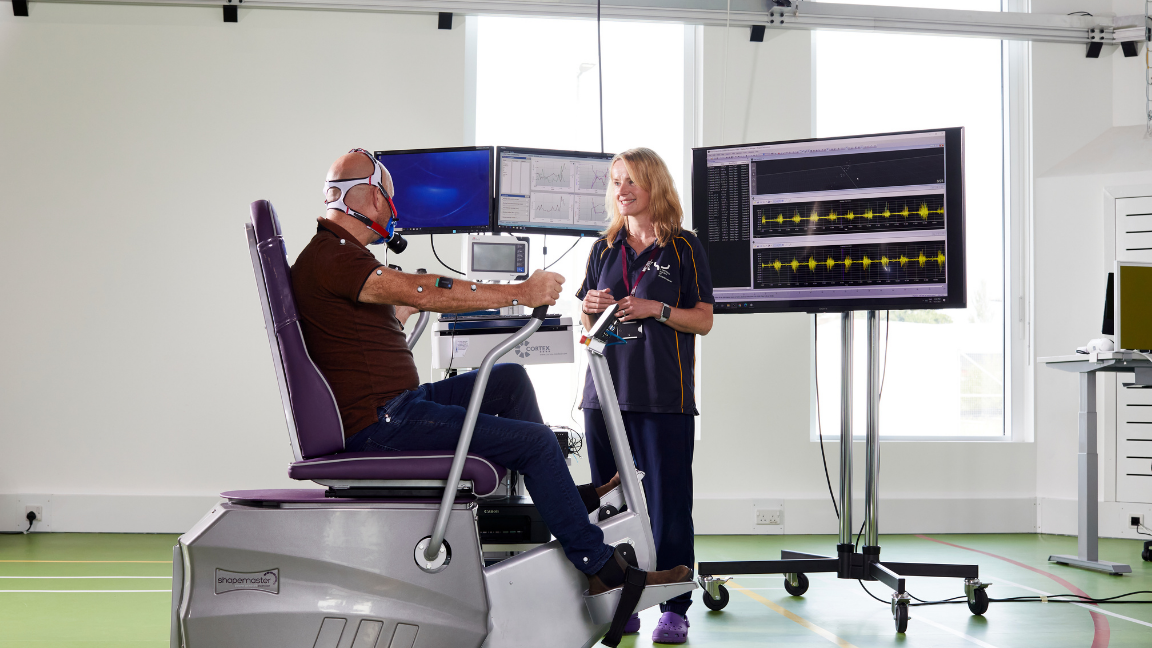Developing skills through knowledge exchange: Rachel Young
In this Q&A, Rachel Young, Co-Lead Neurological Rehabilitation Research and Innovation Programme/AWRC, discusses how our funding facilitated the collaborations she needed to progress her technology.
Project summary: Shapemaster are a UK manufacturer of ‘power assisted exercise’ equipment for people who feel uncomfortable within a traditional gym environment, such as those living with a wide range of long term health conditions. The machines have the potential to provide an exercise solution for people with moderate and severe neurological impairments. Our project aimed to co-design and evaluate an interactive user interface and effort detection programme to align power assisted exercise with published guidelines for people with stroke; generate real-time visual feedback on exercise performance; and quantify user effort. In the future, the project outputs could be potentially translated into intelligent data analytics to create individualised exercise programmes, accessible through a cloud based system.
Collaborators: Shapemaster Global Ltd, Grow MedTech, Sheffield Hallam University and the Advanced Wellbeing Research Centre, The AWRC Wellbeing Accelerator.
Q. How have you found working with co-development partners and what benefits has it brought to your technology?
Together our teams have developed shared goals, allowing us to ensure our academic aims are met, as well as optimising commercial value and real world use. Working with a business has helped us pus our goals towards commercialisation of our research and helped us to look at the research from a business lead approach, which usually means getting things to market speedily.
We’ve also developed collaborations internally – with the Centre for Sports Engineering Research and the Department of Allied Health Professions.
The project is an exemplar of the AWRC vision to design and develop technologies which enable movement for complex populations.
A broad range of participants have contributed to the co-design and testing of the new programme and this has strengthened the network of service users and collaborators connected to the University.
Q. Where was your career and project when Grow Medtech got involved?
I was half way through a part time doctoral research programme when we applied for the Grow MedTech funding. I was an experienced neurological physiotherapist with 25 years’ experience in Higher Education and practice. On completion of my PhD I plan to follow an early career research pathway with a specific focus on the codesign of rehabilitation technologies.
Q. How did Grow MedTech and Translate MedTech help?
The Grow MedTech PoF funding enabled acceleration of my programme of research and facilitated collaboration with the research community at Sheffield Hallam University.
Q. How has your career developed during your project?
By working with external industry collaborators and service users, it has enabled me to develop skills in co-design, data collection, data analysis and usability testing.
It has supported me to complete data collection for my doctoral programme and accelerated progress towards PhD completion.
I have had the opportunity to collaborate with industry and engineering to develop a new technology which will improve outcomes for people with stroke and other clinical populations – and I find that really rewarding.
Q. What is the most unique or interesting thing about this project?
This project really shows how co-design and usability testing methods can be delivered through remote technologies. The team were pro-active in navigating around the challenges created by the Covid-19 pandemic.
It’s also been interesting to work on the digitalisation of an established commercial product to enhance its market potential – in third sector and health care settings. The quantification of user effort will enable future efficacy research; and translation of the programme into a cloud based data analytics system will enable Shapemaster to catch up with its market competitors.
Q. How did you first get involved in your specialist area? What sparked the idea?
I have been collaborating with Shapemaster as a clinical advisor since 2013, and exploration of power assisted exercise was the focus of my PhD.
At the start of my PhD it was my intention to conduct an efficacy trial with the equipment. However, early findings showed the need for improved software and quantification of user effort to ensure readiness for clinical trials.
Q. What inspires you?
Finding solutions for exercise engagement amongst people with complex impairment.
Q. What impact do you hope your work will have on the world?
I hope I can be part of finding a solution for the 80 per cent of the stroke population who don’t engage in regular exercise or physical activity..

